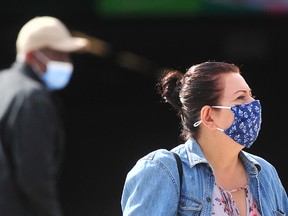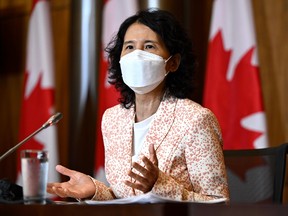Dr. Theresa Tam, Canada's chief public health officer, hopes people have developed the habit of masking. Some remain unconvinced

Article content
With COVID-19 activity indicators creeping upwards, Canada’s chief public health officer this week exhorted Canadians to ready their masks.
Reactions on social media ranged from exasperation and accusations that another round of “COVID tyranny” was coming, to “wear the damn mask now.”
Article content
At a press conference this week with other masked and socially distanced senior public health officials, Dr. Theresa Tam said she hoped “people have developed the habit to be able to use masks as needed during the respiratory virus season, not just for COVID, but for all the other respiratory pathogens” and that “now is the time to get your masks ready if you don’t already have them.”
Advertisement 2
Article content
Why now, nearly four years into COVID?
The National Post spoke with Dr. Horacio Bach, a clinical assistant professor with the University of British Columbia’s division of infectious diseases, and Dr. Nitin Mohan, a physician epidemiologist at Western University’s Schulich School of Medicine & Dentistry.
How receptive will Canadians be to Tam’s messaging on masks?
As National Post columnist Chris Selley wrote, confidence in public health officials has taken a sharp hit since COVID landed on our shores. Tam’s masking advice shifted during the pandemic’s early waves and while public health advice should be revised as the science evolves, “the dramatic and sometimes contradictory shifts may have induced confusion, or worse, mistrust in the messaging or the authorities providing the messages,” one group wrote.
A Leger survey last September of more than 3,000 adults found the majority (70 per cent) would support reintroducing indoor ask mandates should the pandemic situation worsen. “The strongest predictors of positive attitudes were being fully vaccinated or boosted,” Montreal researchers wrote in a letter in the Canadian Journal of Public Health.
Advertisement 3
Article content
Ontario hospitals have begun tightening and re-imposing mask mandates. The McGill University Health Centre in Montreal has made masks mandatory for its health-care workers. British Columbia is mulling restarting mask use in health-care facilities. Masks in hospitals are sensible “for obvious reasons,” Mohan said. “You have patients who are sick and susceptible and vulnerable.”

However, Mohan doesn’t anticipate the return of widespread mask mandates. “We have hospital capacity, we have access to therapeutics, not only vaccinations but antivirals and monoclonal antibodies that we did not have in the first and second waves of the pandemic,” he said.
Still, masking is cheap, relatively easy and a “prudent choice” particularly in the fall and winter months as people congregate closer, he said.
“But we’re very much at the phase of the pandemic where individual agency is the primary driver of folks’ decisions,” Mohan said. “It’s for them to choose what’s best for them.”
What arguments have been made for wearing masks?
That masks can reduce the probability of becoming infected with respiratory viruses like COVID-19, influenza and RSV.
Advertisement 4
Article content
“We did see significant reductions of flu acquisition based on hospital admissions last year,” Mohan said. “We see it in other parts of the world, whether it be Asia or other countries where, during certain peaks of diseases, there is some benefit in masking, not only to the individual but the community at large.”
What about all this hybrid immunity we have? Omicron caused “unprecedented” numbers of infections, and most people in Canada acquired antibodies against SARS-CoV-2 through natural infection and vaccination, researchers reported.
Even in an “era of hybrid immunity,” the researchers cautioned that there’s the potential for waning antibody levels and new variants of COVID-19 that could escape immune responses.
Reformulated vaccines targeting the XBB.1.5 Omicron offshoot that emerged last year are being rolled out. But Omicron EG.5 (Eris) is now dominant in Canada, and Omicron BA.2.86 (Pirola) has also been detected in Canada.
Advertisement 5
Article content
Because SARS-CoV-2 is an airborne virus, masking “will decrease the amount of virus circulating — not to zero, but it will surely decrease it,” Mohan said.
Variants are popping up like a Whac-a-Mole game. “Sometimes the changes aren’t so dramatic and can be recognized by antibodies” from previous vaccinations or infections, said Bach, of the University of British Columbia.
“The problem that we’ve known from the very beginning of the pandemic, our body cannot keep a high level of antibodies against this virus. You have the booster, you are protected, but over time, the antibodies disappear.”
Antibodies also start to wane after natural infections, Bach said. Today’s vaccines target the spike protein, not the whole virus people are exposed to when infected. But not all parts of the virus are immunogenic, meaning able to prime the immune system to make antibodies, Bach said.
Unlike the ancestral stain, the new variants are affecting the upper airways. Excluding those with underlying diseases, “The infections are not going inside the body,” Bach said, meaning deep inside the lungs. Symptoms today are more cold-like: runny nose, sore throat, sneezing, fatigue, muscle ache.
Advertisement 6
Article content
“But every time that someone has an infection, a new mutation is possible,” he said.
What evidence supports the use of face masks?
A Cochrane Review published in March concluded “uncertainty” exists about the effects of face masks, and that the pooled results from randomized controlled trials didn’t show a clear reduction in the spread of respiratory viruses.
The authors, who assessed the effects of other interventions, like isolation, quarantine, and hand hygiene, included 12 trials comparing masks versus no masks, then five trials comparing surgical masks with N95s. (Four in a health-care setting, one in a home setting.)
“Wearing masks in the community probably makes little to no difference to the outcome of laboratory-confirmed influenza/SARS-CoV-2 compared to not wearing masks,” they wrote.
They cautioned against drawing “firm conclusions,” given the limitations of the evidence.
The researchers said potential reasons for the “observed lack of effect” in interrupting the spread of flu or COVID could include a high risk of bias in the trials, poor study design, the quality of masks and how often, and how well, people in the trials actually wore them, especially children. Factors could have included people contaminating masks with their hands or “saturation of masks with saliva from extended use.”
Advertisement 7
Article content
Nevertheless, the study led to a flurry of headlines that “masks don’t work,” prompting the editor-in-chief of the Cochrane Library to issue an apology for the wording used in a “plain language summary” that she said was open to misinterpretation.
“Based on the evidence that I’ve reviewed, based on hospital admissions, based on trends in disease states, I’m comfortable with the guidance that masking is effective,” Mohan said.
“Again, it’s very much on the individual to make that choice for themselves, based on their own risk factors and their interpretation of the information.”
Why the pushback against masking?
“I have no clue why,” said Bach, who has been yelled at for wearing masks. In Asian cultures, “they go out with a mask. They protect not only themselves but also other people. You cough, you sneeze, you disperse the virus everywhere. They use the mask when they need it, and nobody makes it an issue.”
“I don’t know what will happen if they (public health officials) say you have to use masks again. That will be a big deal.”
People are frustrated COVID is still part of our lives, Bach said. “I don’t think anyone is happy that COVID is a part of our reality this far along in this pandemic.”
National Post
Our website is the place for the latest breaking news, exclusive scoops, longreads and provocative commentary. Please bookmark nationalpost.com and sign up for our newsletters here.
Article content
Mask up again? Here's what to know about the call to ready masks - National Post
Read More



Comments
Postmedia is committed to maintaining a lively but civil forum for discussion and encourage all readers to share their views on our articles. Comments may take up to an hour for moderation before appearing on the site. We ask you to keep your comments relevant and respectful. We have enabled email notifications—you will now receive an email if you receive a reply to your comment, there is an update to a comment thread you follow or if a user you follow comments. Visit our Community Guidelines for more information and details on how to adjust your email settings.
Join the Conversation